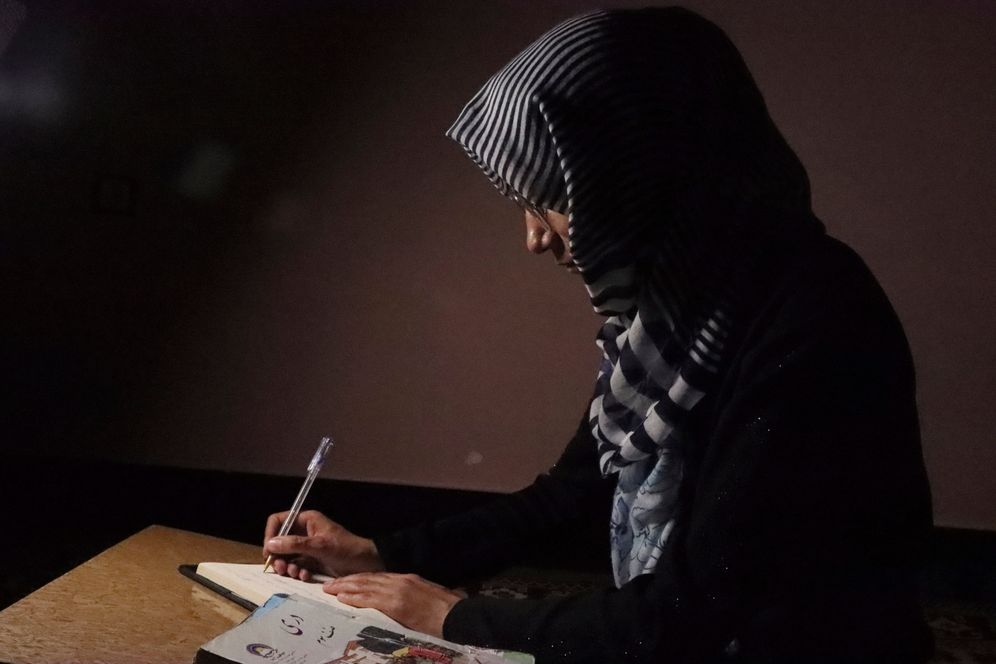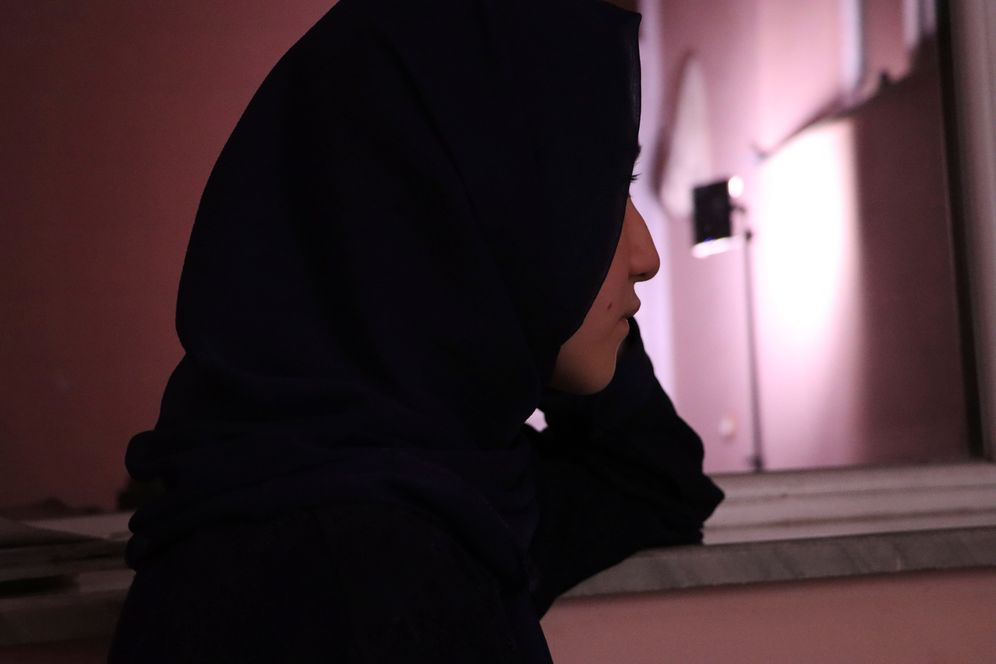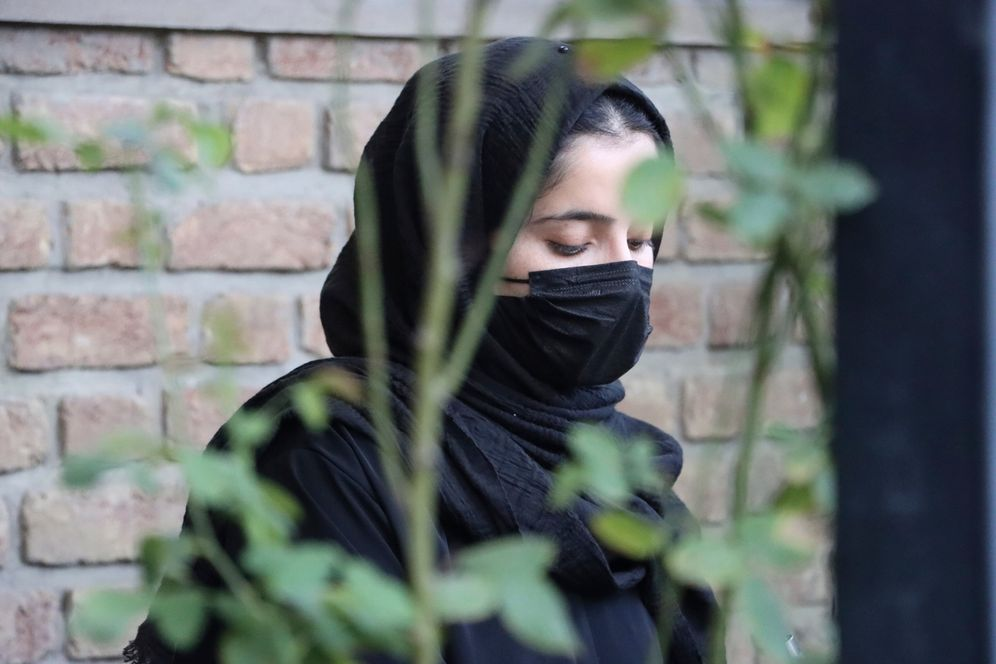The lives of Kobra, Najia, Madina, Sonya and Zahra looked as though they were just getting started two years ago. When the Taliban captured the Afghan capital of Kabul, they were about to finish school, working towards a university degree or beginning a career. Suddenly, though, their lives changed dramatically.
The five Afghan women between the ages of 14 and 29 all belong to less privileged layers of society and were the beneficiaries of the relatively liberal laws and new educational opportunities that existed in the republic. But all that came to an end with the Taliban victory.
Through email and video interviews, they spoke with DER SPIEGEL about what has become of their lives in the two years since the country’s new rulers have pushed women out of public life. They speak of the end of their dreams, depression, economic struggle, disappointment with the West and their fury with the Taliban. And they also write about what the West and the security forces of the toppled republic were unable to provide, but the Taliban can: Security
Kobra, 29, was a teacher at a private school in Kabul. She has been unemployed for almost two years. She was the family’s only breadwinner. The father of the family left her mother early on. They are from the central Afghanistan province of Bamyan.
Najia, 14, former high school student. Currently lives with her mother and sister, Kobra, in the home of an uncle in Kabul.
Madina, 23, was pursuing a degree in economics in Kabul until the Taliban closed universities to women last December. Today, she is unemployed and lives with seven siblings in the capital.
Sonya, 23, studied engineering in Harat. She was forced to leave the university in her fourth year, shortly before completing her studies. Currently, Sonya is doing an internship with a construction company. She lives with her parents in a small rental house.
Zahra, 24, is unemployed. She studied literature in the eastern province of Khost and taught at a private school in the capital. A few days ago, she found a job with an aid organization in Kabul. Her dream is to become an author
Kobra
You, who call yourself students of religion, Taliban – are you aware that the Islam revelations begin with "Read!”? This applies to both men and women. You have transformed our faith into an anti-religion!
The Prophet calls on us to strive for knowledge, and He doesn’t differentiate between the sexes, but you prohibit us from learning. If the education of girls were forbidden in Islam, then why does it exist in every single other Muslim country?
Why have you closed higher level schools to girls? Why have you taken our voices? Why have you robbed us of the freedom to go outside? What crime is it to express one’s thoughts? But you don’t want us to speak about our oppression!
The world was made for all humans. God gave us the ability to discover nature, use our voice, to see, to travel. Why have you taken away our right to work? You have brought poverty and death into our homes. You yourself are in opposition to God. You are keeping us in prison. And you claim to be the real Muslims?
Madina
There are seven of us in the house. My brother used to work as an IT specialist at a tech company, and my sister was a teacher. Together, we earned $400 per month and we were doing well. After the fall of the republic, my brother and sister both lost their jobs. Now, my older sister teaches online. A foreign aid organization pays her $200 per month. That’s what we live on.
She's my great role model. I want to become a courageous woman like her. Before the Taliban arrived, she fulfilled as many of our wishes as she could with her salary. She bought us clothes for religious festivals or parties. I want to do the same. But the Taliban have bound our hands and feet. My head hurts. What will become of us? I just want to curl up alone in a corner and cry.

Sonya
A few years before the Taliban toppled the republic, I had an experience that completely changed my life. I was washing the dishes in the kitchen when a TV moderator started interviewing a woman who had earned her diploma at Mehri Heravi High School in Herat and then studied construction engineering at Herat University. I looked up in surprise. The woman was married and had two children, and she was presented as a successful construction engineer. She had achieved everything, she had made the impossible possible! And as she talked about all the difficulties she had overcome, I felt a positive energy flowing through me. "You see how the strength and the ambition of an Afghan woman can break through all the walls of limitations?" I called out in excitement to my brother. On that day, I made my decision. Like this woman, I wanted to study engineering. I enrolled; I had a single goal. I loved what I was doing and made it all the way to my fourth year at university. I wanted to go on to study physics, get to know new countries and travel to space. But then, the Taliban arrived and closed the universities to us women. I tried to get around the ban and enrolled in a drawing course. But it was cancelled. I tried again, I wanted to learn English. But there are no longer any English courses for women in Herat.
Why do the Taliban stand in the way of women’s advancement and their presence in society? It’s because they are afraid that women’s knowledge will limit their power.
Kobra
Qari Hamdallah, yes, I mean you. The one who, every time I leave the house, is standing at the intersection in front of the bus stop and examining the women with those piercing eyes to see if they are obeying. You yell at the drivers if they transport men and women in the same cars. You shove your guard-dog eyes through the car window to examine our clothing. Your gaze feels like a bucket of cold water over my head. I have no male escort, but I leave the house anyway.
Your arrival in Kabul transformed my dreams into nightmares.
Do you know how much effort it took to get to where I was? I studied day and night for the entrance exams for the public university in my favorite city Kabul. My mother is illiterate. We lived in Bamyan and moved to the capital. I was able to earn enough money for the entire family. We weren’t a burden on anyone. Later, as a teacher in a private school, I taught both boys and girls from the seventh to the 12th grade. My sister went to a school for English and painting. I fulfilled my mother’s wishes. We lived in a small house. We were happy.
Since my childhood, you have forced your way into my life with your suicide attacks, or when you would set fire to our schools and mosques. I am a Shiite Muslim. Even as a child, I knew that the Sunni Taliban were the enemies of women and girls. When I used to travel from Kabul to Bamyan, I would cross Shahr Square, which was so frequently the target of your atrocities. Sometimes, the street was still bloody after yet another one of your attacks.
Qari Hamdallah, you who are standing everyday at the bus stop at the intersection: Do you actually know what you have inflicted upon me?
With your arrival, our lives darkened. On the day you came, I ran home from the school, and everything changed. Girls were no longer allowed to learn, I lost my job. You slammed shut the doors of my life. Now, I sit at home, waiting for my uncle to give me a bit of money. We have sold my mother’s jewelry because we had no more bread to eat. I hate asking other people for money.
In the years of the republic, there was less security. But it was still the best time of our lives. Because we were free.

Madina
On the order of the supreme leader of the Islamic Emirate, the beauty salons in Kabul and the provinces were closed down. The last hairdresser we went to was the one at Makroyan Market back in April. I wanted to get my hair done for Eid al-Fitr, the fast-breaking festival. All of the women there had bitter stories to tell – about the unemployment of their husbands, children and brothers. My mother, too, lamented the fact that my father and brother were jobless.
The owner of the salon was concerned. She was the breadwinner for her family. Her husband had died of cancer several years previously and she has two sons and four daughters. "How can feed my children and pay our high rent if the Taliban decide to close down the salons in Kabul?” she wanted to know. They had already been banned in some of the provinces. Now, the capital has also met the same fate.
Being beautiful is not a sin! God is beautiful and God loves beauty. Allah tells us to wear clean, orderly and beautiful clothes for Him, and to be beautiful for Him. Being beautiful does not mean that women are bad or tainted.
When women are sad, they can improve their spirits by putting on makeup. Looking nice is not a crime. Working in salons were among the last jobs available to women.
Sonya
What would it look like if God had created everything without color? Would you still want to see? What would then be the difference between the forest and the desert? Between a blue sky and a cloudy one?
With the closing of the beauty salons and the ban on makeup, the Taliban robbed Afghan women of color. Beauty gives us composure. Some even try to hide their spiritual wounds with makeup. With the ban, the Taliban erased color from women’s faces and washed away the fragrance that surrounded them. The Taliban make women feel like they are dead. But we are still alive.
The Taliban see us women as the source of sin and corruption. If they succumb to lust, it is a sin that in their eyes stems from the freedom and beauty of women. If women were allowed to walk around freely, then the Taliban, who see themselves as the true Muslims, might commit sins because they feel attracted to these women. Isn’t it interesting that those who clearly aren’t able to control their own desires and moods claim that they are able to rule an entire country?

Madina
Freedom also had a price. When we used to walk into the center of Kabul – to Maryam High School, Pamir Cinema or to shop at the Makroyan Market – we would often encounter men with poor manners. They had nothing better to do than harass us. In crowded buses, they would touch our bodies. They would say obscene things, stick their telephone numbers in the folds of our robes or let their notes fall to our feet for us to pick up. Now that the Taliban are here, that no longer happens. Men on the streets now behave themselves. Because it’s not just the women who are afraid of the Taliban, the men fear them too.
I am grateful to the Taliban for some things. There are now seats for women on the bus. And they have regulated food prices. Some things had grown so expensive that we were only able to eat rice and beans for months on end. Now, we can buy meat every two or three weeks. There, they have done well. But why don’t they use their power for the benefit of everybody?
Najia
It was the 10th day of the month of Muharram. After I had breakfasted and cleaned the house, my mother, my sister Kobra and I went to the mosque. Armed Taliban police were there to secure the mosque. For as long as I can remember, we Hazara, as Shiite Muslims, have been the target of the deadliest Taliban attacks. How strange, I thought: Only two years ago, these same Taliban killed thousands of innocent Shiites with their attacks on schools and mosques. And now they have come to protect us?
How can we trust them? In the eyes of the Taliban, we are nothing but infidels. Worthless, without rights. The world should know that us girls start every day here with desperation. There is nobody we can tell about our pain, and nobody who wants to hear it.

Kobra
Families where there is no man are being denied their existence by your laws. We are one such family. How are we supposed to earn our bread? Show me the religion where it is said that people should live in poverty and sell their organs and their children to feed themselves? All that is happening here in your empire.
Madina
After the collapse of the republic, classes continued at the university for a few weeks. At first, the Taliban claimed that classes would continue. They set up divides between the male and female students and there were also so-called culture classes. The instructor would ask about surahs from the Koran and threatened that those who couldn’t recite them by heart would be thrown out of the second story window. I trembled. Fear became my constant companion.
Taking away our right to education and work is like forbidding us from eating and breathing. It kills the human soul and destroys society. It’s like cutting through the roots of civilization.
Zahra
Where are you today who spent all those years living with us here? You diplomats and politicians, as you were called by the powers of the world, the so-called international community? You are silent, as if Afghanistan was no longer part of the world and there were no longer any humans here.
I am furious at you international media, you journalists, who are now silent. You limited your coverage to the initial days after the Taliban takeover, and now – now that we are under much greater strain – you have left us alone.
I am furious at you Taliban, who are inflicting such damage on your country. At you who lack even a shred of humanity. I don’t know where you learned your ruthless recipes, which cannot be found in any book.
I am furious at you, the man who calls himself our father, Ashraf Ghani, the president who left the Afghans behind with no protection. It is now easy for the Taliban to oppress the people in this forgotten country, to steal the girls and force them into marriage. And we, those who remain here, continue to water the flowers of our hope so they do not wilt.

Madina
When the Taliban hear music coming from our yard, they storm the party, beat up the DJ and claim that music is haram, forbidden. Female athletes are no longer allowed to take part in competitions. Women and girls may no longer participate in art exhibits. When we demonstrated for our rights, they met us with tear gas, clubs and water cannons. I don’t know which is greater: My hatred for the Taliban, because they took all that away from us, or my anger at the imagination with which they did it.
Sonya
Woman can do many different things at the same time. They can be a good mother, a good wife, a good sister and be an engineer, politician or astronaut at the same time, all those things that men are able to do. But the Taliban don’t want to share power with the other half of society. They know: An increase of power for women means a decrease of their own. That's the real reason they define women as creatures that have no needs of their own.
They only want women around to serve their pleasure and take care of other needs. Now, though, they are unexpectedly encountering women in Afghan cities who are strong, educated and able. For the Taliban, that is unacceptable.
Some men here say that the real crime the Americans committed here was that of instilling nonsense in the minds of women. And that they are no longer willing to accept the intended fate of an Afghan woman.
The Taliban should know: If they erect walls on the path to our goals, we will become ladders. If they burn the walls, we will become water. If they increase the pressure, we will grow stronger.
The fact that I am still writing proves: I hope, I laugh and I am still moving. And I won’t stop until I get what I want





i removed it because it was reported as misinformation